RHI: DUP advisers 'withheld key information' about abuse
- Published
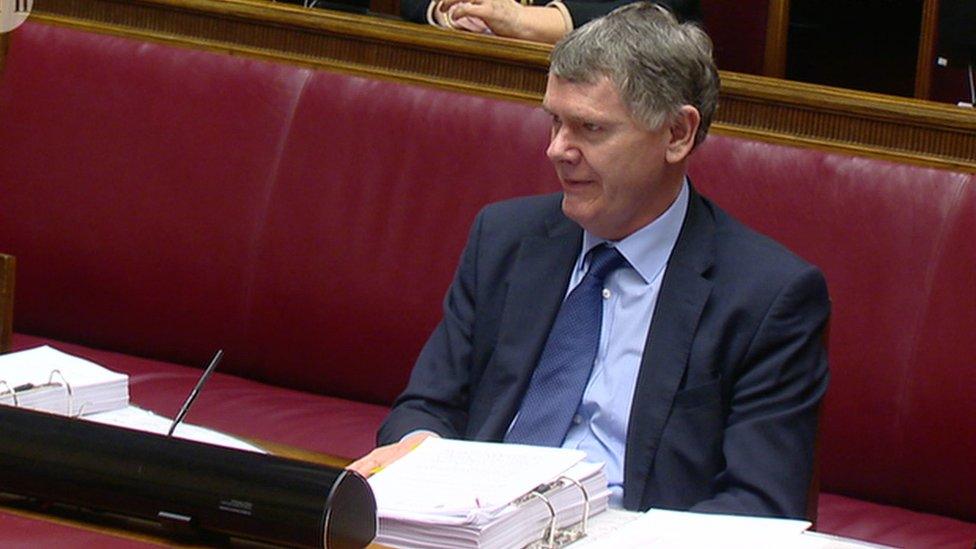
Andrew McCormick was the enterprise department's permanent secretary
Two DUP advisers withheld key information from officials about abuse of NI's flawed green energy scheme, a senior civil servant has said.
Andrew McCormick made the claim at the Renewable Heat Incentive (RHI) inquiry.
Ex-advisers Andrew Crawford and Timothy Cairns have denied the allegation.
The scheme was set up in 2012 to boost uptake of eco-friendly heat systems, but large subsidies left NI taxpayers with a £490m bill.
Its failings led to the establishment of a public inquiry in January 2017.
Mr McCormick was the permanent secretary in the enterprise department, which set up the RHI scheme, when problems emerged in summer 2015.
At the same time, Timothy Cairns was the special adviser in the department, working with DUP Enterprise Minister Jonathan Bell.
'Slow-witted'
Mr Crawford had been the previous enterprise adviser, but had moved to the finance department with then Finance Minister Arlene Foster in May that year.
But he remained in contact with Mr Cairns over proposals for RHI cost controls in summer 2015.
An email from Mr Crawford to Mr Cairns at the end of July 2015 talked about abuse of the scheme, where poultry farmers were "heating empty sheds" because the subsidies were so lucrative.
The scheme's critical flaw was that claimants could earn more money by burning more fuel by installing multiple small biomass boilers instead of one larger boiler, which would have been more energy efficient but was not as financially attractive.
Mr McCormick said, had the threat to the budget been communicated clearly by the DUP advisers to departmental officials, they would have acted on it.
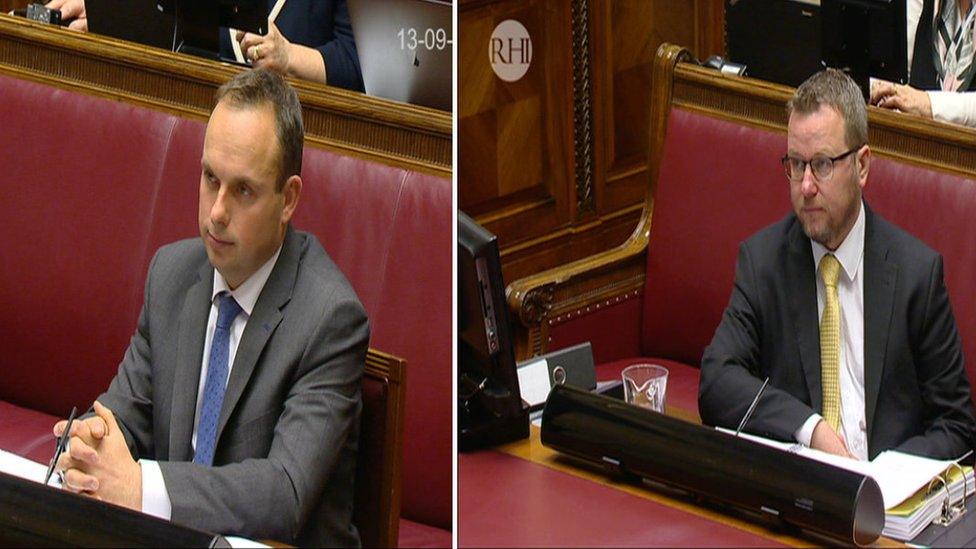
Andrew Crawford and Timothy Cairns have said they passed on concerns about alleged abuse of the RHI scheme
Mr Cairns has told the inquiry that he raised the issues in Mr Crawford's email with senior enterprise official Chris Stewart.
Mr Stewart said Mr Cairns had raised issues of a spike and vague allegations of abuse, but had not been specific.
On Wednesday, Mr McCormick said had the information been conveyed in blunt terms it would not have been lost on officials.
"We've had to admit to a lot of things that made us look unimaginative, leaden-footed and slow-witted, but we're not completely stupid," he said.
"If Chris (Stewart) had been told that, we would have acted on it."
Mr Crawford has said in his evidence that he reported the concerns to Mr McCormick, but the senior civil servant said he would have followed it up thoroughly if he had learned of the serious allegations.
'Conspiracy of silence'
But inquiry panellist Keith MacLean said rather than suggesting information had been withheld, it looked like the information had been passed on, but had not been understood.
Mr McCormick was also asked whether he thought it was a "fair assessment" from the enterprise department that there had been a "conspiracy of silence" from some to withhold information of abuse from officials.
It has been claimed certain industry officials knew the scheme could be exploited for profit, but did not tell the department.
On Wednesday, Mr McCormick said it appeared that the suggestion had been an "overstatement".
He said he accepted that "quite a few people seem to have tried to draw those to the attention of the department", and deserved credit for doing so.
He described the department's claim as "unfair", and that while he believed some did know and did not tell, those who did try to flag it up were not always properly listened to.

The RHI scheme sought to boost the use of renewable energy in NI, but a peverse incentive meant claimants could exploit the scheme for profit
Earlier on Wednesday, the inquiry heard Stormont officials may have been able to suspend NI's flawed green energy scheme before its budget ran out of control in autumn 2015.
At that time, civil servants were drafting proposals to address the scheme's critical flaw - that claimants could earn more money by burning more fuel by installing multiple small biomass boilers instead of one larger boiler, which would have been more energy efficient but was not as financially attractive.
At a senior management team meeting on 17 June 2015, the option of suspending the scheme was floated.
A planned review of it, which had been a condition of getting initial scheme approval, had not been done - although officials later told the finance department it had been carried out.
It was suggested that not carrying out the review might provide a legal basis for suspension until the end of the 2015/16 financial year.
Legal advice
But there appeared to be a disagreement between finance and energy officials in the department about the best way forward.
Energy officials believed RHI was a good scheme that was delivering its key objectives, and had not been allocated a sufficient budget.
Finance officials were more focused on bringing spending under control.
Ultimately, the suspension option was not chosen and officials instead began working to change the lucrative flat rate payments into subsidies paid on a tiered basis, with a higher rate paid for 1,314 hours of heat generated, before a lower rate kicked in.
That happened partly because the department had received legal advice that the safest way to change the scheme was by amending the legislation governing it.
On Wednesday, Mr McCormick told the inquiry he did not recall seeing or asking to see the legal advice.
Inquiry counsel David Scoffield said the advice did not say that the scheme could not be suspended, nor did it state that adding tiering was the only way forward: the lawyers simply said any action the department took should be done through legislation, which would have to involve a public consultation.

Who is Andrew McCormick?
He was the top civil servant - the permanent secretary - in Stormont's enterprise department, who had to clean up much of the mess of the RHI scheme.
He arrived at the department in 2014, long after the scheme was conceived, and in summer 2015, drew then minister Jonathan Bell's attention to major concerns over its operation.
In February 2018, he was appointed director general of international relations for Brexit, external, working in the absence of an executive to form Stormont's plans for the UK's exit from the EU.

Mr McCormick said the department's view was that a consultation would have taken too long.
The department's rationale for not going ahead with consultation was that it had carried out one about general cost controls in 2013.
'Bizarre'
But the specific mechanism that officials wanted to add to the scheme was not mentioned in that 2013 consultation, something Mr McCormick said he now was not sure was "100% sound" about.
Asked whether the department took legal advice before it made its decision, he admitted that he did not know.
That led inquiry chair Sir Patrick Coghlin to describe the situation as "bizarre".
The work on tiering eventually took until late November 2015 to conclude, and in that three-month gap there was a huge spike in boiler applications to the scheme, which committed hundreds of millions of pounds of public money over its 20 year term.
Sir Patrick said going for temporary suspension would have "prevented the further waste of public money" and given officials time to bring in cost controls.
Mr McCormick agreed with that.
He said the view of energy officials in the enterprise department, was that it was a good scheme that was finally delivering.
'Collective failure'
They had a "very strong view" that intervening to cut it off in a "draconian way" would be the wrong thing to do.
He said he now accepted that more probing questions should have been asked.
"I feel we missed a big opportunity," he said.
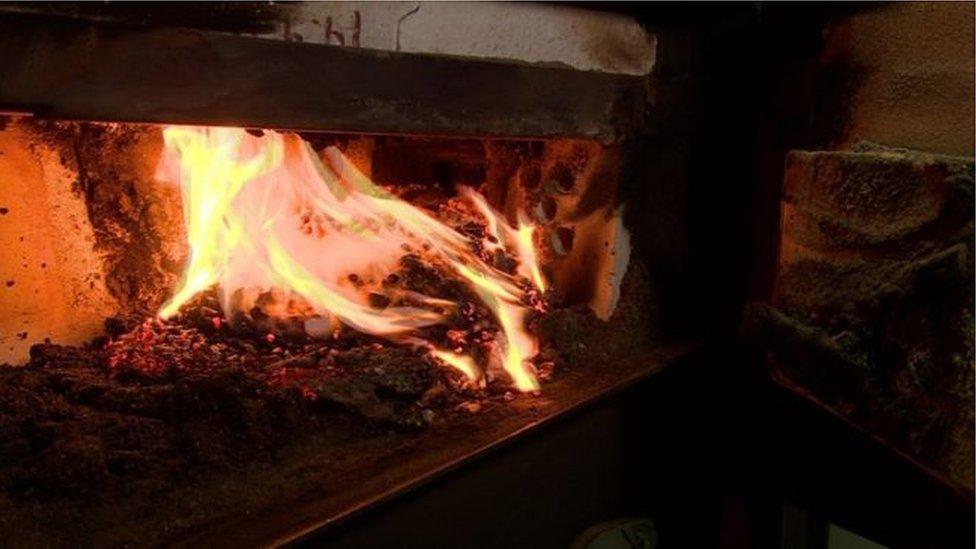
A four-week delay in implementing RHI cost controls in autumn 2015 allowed a massive spike in applications to the scheme, which severely impacted its budget
"There's so much there that could have been looked at, this looks to me like a collective failure."
He added that he had spent a lot of time looking back on evidence to the inquiry "regretting not asking more questions" about the scheme.
Mr Scoffield said that after the meeting in June, the inter-departmental "squabbling" stopped and a course was set for the introduction of tiering as a way of controlling spending.
Mr McCormick agreed that he had not understood how tiering would bear down on the overall cost of the scheme.
There had been no comprehensive "lifting of the bonnet", he said.
Mr MacLean said part of the problem was that the people explaining it to Mr McCormick did not actually understand how it would work either.
'Disclosing our hand'
Later, Mr McCormick told the inquiry it was an "error of judgment" for the enterprise department to liaise with industry about proposed RHI changes prior to being announced.
The panel heard of an exchange in July 2015 between Fergal Hegarty of Alternative Heat, a company that supplied boilers to installers, and enterprise official Stuart Wightman.
It contained details of the tariff tiering plans, and the timescale for changes to be brought in.
The inquiry has already heard evidence about similar contact between Stormont officials and energy and agri-food businesses.
But Mr McCormick said he was not aware of any of it in summer 2015.
He said it was "inappropriate" for the information to have been shared at that point, as it gave the market a heads-up to get applications in before the changes took effect.
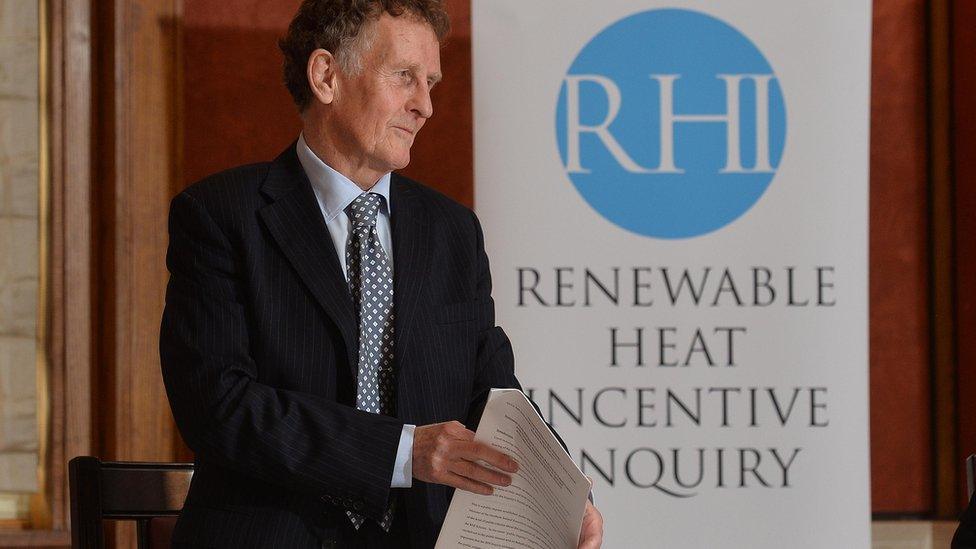
The RHI public inquiry is being chaired by Sir Patrick Coghlin and has heard 102 days of evidence so far
His view was that "this was not a conventional policy development process being done in a calm context" and that the department was "disclosing our hand far too openly".
"The effect of this disclosure was to make the problem worse," he added.
He said it was one thing to engage with industry and ask for its views on proposed changes, but to reveal so much detail before the information had even been seen by the enterprise minister was "unacceptable".
'Faffing around'
On Wednesday afternoon, Mr McCormick gave the inquiry his version of events at a key meeting that led to a disastrous delay in cost controls being implemented to the RHI scheme.
The decision to push back introducing subsidy cuts from 1 October until mid-November was taken at a meeting on 24 August 2015.
It allowed a further 800 boilers to be accredited to the scheme, adding a huge sum to the overall cost.
In his evidence, Timothy Cairns said he had not suggested the November date for cost controls - but it had been put forward by another enterprise official, John Mills.
Mr McCormick said he was going to intervene but had "acquiesced".
He put that down to relief that there had at least been a decision after months of "faffing around".
'Clear distinction'
In his evidence, Mr Cairns claimed it had been a throwaway line and he was surprised it had been agreed to by officials.
Mr McCormick said it had been a much more formal request, although he conceded he could not recall Mr Cairns putting forward a rationale for proposing the delay.
"It's hard to be clear what you do recollect and what you don't," remarked Dr MacLean.
Sir Patrick added that there was a "clear distinction" between the two men's account of the extension request.
He said Mr Cairns told him Andrew Crawford had been behind the delay in January 2017, just before Mr McCormick named Mr Crawford at a hearing of the assembly's Public Accounts Committee as the instigator of the delay.
Mr McCormick will give evidence again on Thursday.
The inquiry's oral hearings are due to finish at the end of October.
- Published5 September 2018
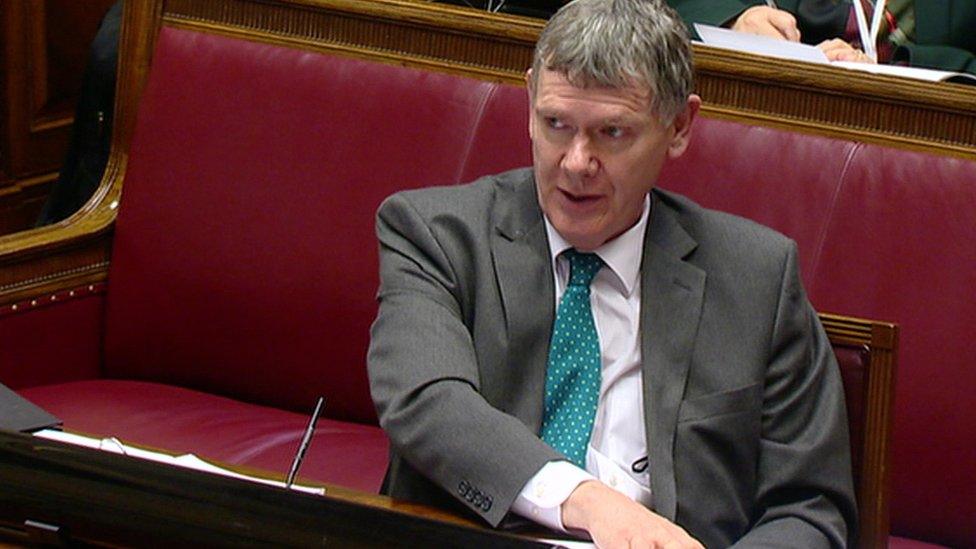
- Published4 September 2018
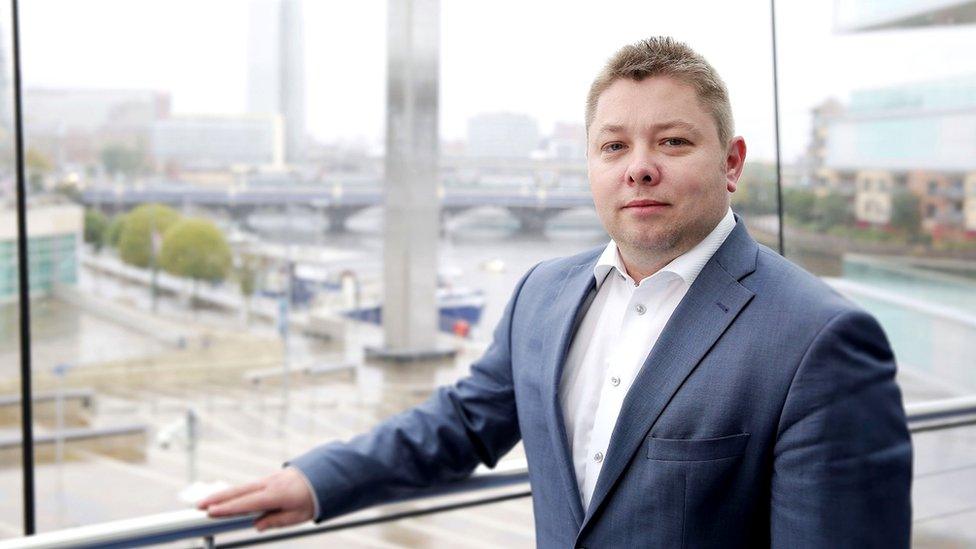
- Published23 October 2019

- Published7 November 2017
